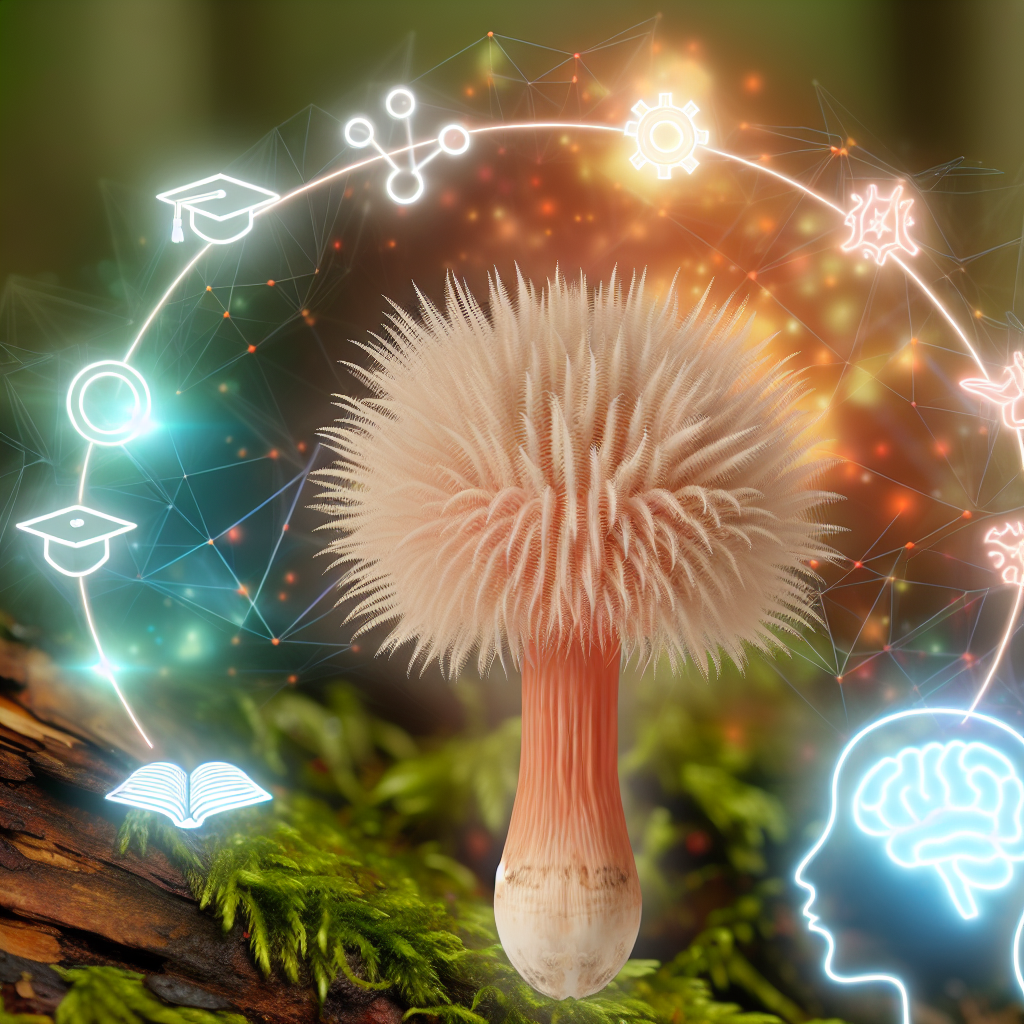Here is the clean, formatted blog post with expanded content, highlighted keywords, and a concise summary:
Lion’s Mane Mushroom: Brain Health Benefits and Memory Support
Unlocking Cognitive Potential with Nature’s Smart Mushroom
As modern medicine evolves, more practitioners are turning to natural remedies like Lion’s Mane mushroom (Hericium erinaceus) for their therapeutic potential. This unique mushroom, with its cascading white tendrils resembling a lion’s mane, has been used for centuries in Traditional Chinese Medicine and is now gaining international acclaim for its cognitive-enhancing capabilities.
Lion’s Mane is increasingly recognized for its potential to support brain health, enhance memory, and possibly protect against neurodegenerative conditions like Alzheimer’s and dementia. This is due to its two primary bioactive compounds – hericenones and erinacines – which stimulate the production of Nerve Growth Factor (NGF), a protein essential for the growth, maintenance, and survival of neurons.
Modern research is validating the neuroprotective and neuroregenerative properties of Lion’s Mane. Studies have shown it can improve cognitive function in older adults with mild cognitive impairment, regenerate damaged neurons, and even reduce inflammation in the brain – a contributing factor in many neurological disorders. Ongoing clinical trials are exploring its potential as an adjunct treatment for conditions like Alzheimer’s and Parkinson’s.
Beyond memory and cognition, Lion’s Mane has also demonstrated anxiolytic and antidepressant effects, likely linked to its role in neurogenesis and mood regulation. As a natural ally for lifelong brain health, integrating Lion’s Mane into one’s wellness routine may be a wise and effective choice for those seeking mental clarity, memory support, and long-term neuronal wellness.
Backed by Science: Lion’s Mane and Brain Function
One of the most exciting breakthroughs with Lion’s Mane is its ability to stimulate the synthesis of Nerve Growth Factor (NGF), which plays a critical role in the development and survival of neurons. A study published in Phytotherapy Research found that daily intake of Lion’s Mane improved cognitive function in older adults with mild cognitive impairment. Mori et al. (2009) showed that participants who consumed 250 mg of Lion’s Mane powder three times daily for 16 weeks had significantly increased scores on cognitive function scales compared to a placebo group.
Animal studies have further elucidated Lion’s Mane’s effect at the cellular level. Wong et al. (2011) found that rats with induced cognitive deficits showed remarkable recovery in memory and learning functions after supplementation with Lion’s Mane, attributed to the mushroom’s ability to regenerate damaged neurons and enhance synaptic connections.
Research has also shown that erinacines from Lion’s Mane can cross the blood-brain barrier and stimulate the production of NGF directly in the brain, supporting neuron regeneration and potentially slowing disease progression in neurodegenerative conditions like Alzheimer’s. Kawagishi et al. (2008) published these findings in Neurochemical Research.
Beyond cognitive benefits, Lion’s Mane has demonstrated anxiolytic and antidepressant effects. A 2010 study published in Biomedical Research found that menopausal women who consumed Lion’s Mane cookies daily reported lower levels of anxiety and irritation compared to the control group. Nagano et al. (2010) attributed these emotional benefits to Lion’s Mane’s role in neurogenesis and NGF production, which affects mood regulation.
Conclusion: A Natural Ally for Lifelong Brain Health
Lion’s Mane is more than a culinary delicacy or traditional remedy – it is a scientifically supported natural ally for cognitive health. Its unique bioactive compounds promote nerve regeneration, enhance memory, and may offer protection against age-related cognitive decline. As studies continue to explore its neuroprotective properties, Lion’s Mane stands at the frontier of natural treatments for optimizing brain health. Whether you’re seeking mental clarity, memory support, or long-term neuronal wellness, integrating Lion’s Mane into your wellness routine may be a wise and effective choice.
References
- Mori, K. et al., 2009. “Improving effects of the mushroom Yamabushitake (Hericium erinaceus) on mild cognitive impairment: a double-blind placebo-controlled clinical trial.” Phytotherapy Research
- Wong KH, et al., 2011. “Neuroregenerative potential of medicinal mushrooms.” Journal of Agricultural and Food Chemistry
- Kawagishi H., et al., 2008. “Erinacines from the mycelia of Hericium erinaceum stimulate NGF-synthesis in vitro and promote axon regeneration in mice.” Neurochemical Research
- Nagano M., et al., 2010. “Reduction of depression and anxiety by 4 weeks Hericium erinaceus intake.” Biomedical Research
Concise Summary:
Lion’s Mane mushroom is a unique functional fungus with impressive cognitive-enhancing capabilities. Its bioactive compounds stimulate the production of Nerve Growth Factor (NGF), promoting nerve regeneration, memory enhancement, and potentially protecting against neurodegenerative conditions. Backed by scientific research, Lion’s Mane is positioned as a natural ally for lifelong brain health and cognitive wellness.

Dominic E. is a passionate filmmaker navigating the exciting intersection of art and science. By day, he delves into the complexities of the human body as a full-time medical writer, meticulously translating intricate medical concepts into accessible and engaging narratives. By night, he explores the boundless realm of cinematic storytelling, crafting narratives that evoke emotion and challenge perspectives. Film Student and Full-time Medical Writer for ContentVendor.com




